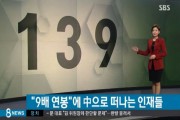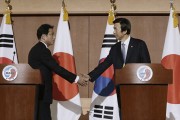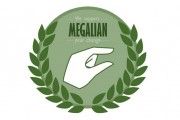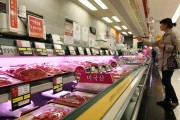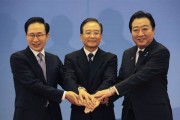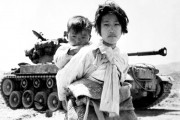Netizens heaped scorn on the government after the announcement that South Korea and Canada signed a free trade agreement that would clear the way to sell more Korean cars overseas and more Canadian beef domestically. Online, comments criticized politicians for working to help Hyundai-Kia at the expense of poor rural farmers. Similar opinions were common during the passing of the recent Korea-U.S. free trade agreement and talks about a Korea-China agreement.
Article from Seoul Shinmun:
Korea-Canada FTA ratified; Benefit for Korea Auto Industry, Blow for Livestock Industry
A Korea-Canada free trade agreement (FTA) was ratified on March 12th in what is seen as a move that will benefit South Korea in automobiles, auto parts, textile, machinery and electronics and will allow Canada to profit in livestock, including beef and pork.

Canadian Prime Minister Stephen Harper and President Park Geun-hye held a joint press conference to announce the passing of the FTA
Observers say that the Seoul-Ottawa pact is not much different from previously concluded agreements Seoul signed with major economies in that the bilateral agreement can be seen as a “boon to auto and home appliance industries.”
For South Korea, the biggest beneficiary from the latest FTA is the auto industry.
Analysts say that the South Korean government has channeled its efforts into knocking down the maximum 6.1-percent tariff Canada imposes on Korean cars.
The agreement shows that Canada will phase out the current 6.1 percent auto tariff within two years after the FTA takes effect, allowing cars of Korean origin to go into the Canadian market without tariffs.
This phase-out in the accord with Canada will puts Korea at an even greater advantage in auto exports than the Korea-U.S. FTA, which provided for the removal of U.S.-imposed 2.6% tariffs on Korea-made cars five years after ratification.
Another upside for South Korea is found in machinery and electronics. Under the FTA, Ottawa is set to abolish 6% refrigerator tariffs three years after the FTA’s comes into effect and 8% washing machine tariffs upon the agreement’s ratification.
Currently, wireless phones, semiconductors, steel and petroleum products are exported to Canada without tariffs. This raises the prospect that the FTA will result in most machinery and electronics exports to Canada entering the country without any tariff.
Meanwhile, Korea will have to open its agriculture and livestock market to Canada, which has pushed to eliminate the current 40 percent tariffs South Korea has slapped on beef, and to further open the market to other agricultural products.
Under the freshly-inked FTA, South Korea is obligated to remove tariffs on beef, pork belly and other pork parts within 15 years, 13 years and 3 years respectively.
Since South Korea has already signed free trade agreements with the United States and Australia, Canadian beef and pork are expected to begin competing with imports from the other two countries for a greater market share in South Korea.
As a consequence, the Seoul-Ottawa FTA will deliver another blow to local livestock farmers. The Assistant to the Vice Minister of Trade and Natural Resources told a press conference in Sejong, South Chuncheong Province, “The local livestock industry will take a beating. Although it’s hard to talk in specifics about measures to cushion the blow, I pledge to draw up the measures in consultation with other government ministries.”
Last year, Canada posted 91 million dollars worth of meat exports to South Korea. That number makes up just 1.9 percent of South Korea’s meat imports, explained in large part by the stiff import tariffs on Canadian meat, which ranged from 3 percent to a staggering 72 percent. The FTA signing can be seen as a significant success for Canada
Comments from Naver:
suwa:
So the country becomes the Kingdom of Hyundai-Kia.
kims:
And the rich get richer while the poor get poorer.
poon:
So those poor bastards sacrifice for the sake of those bastards who have so much.
kass:
Who are we living for? For the corporations, apparently.
yaho:
One day all of the FTA corruption will be exposed. History will be the judge…
icem:
Please allow us to ride in a European car, tax-free! How much longer will we protect the domestic automakers at the expense of our consumers?
muld:
Our farmers and fishers are frustrated at the way their industry has been distorted. The consumers are also frustrated. I think if we could just reform the middle-men for farmers and fishers, then we would be well able to respond to the FTA. We know that imported beef and pork can’t rival hanu or native pork when it comes to taste. But it’s just too expensive. The farmers cry about plummeting prices while the consumers always complain about the lack of price decreases. We have to reform the middle-men.
good:
I have thought about what compensation the Lethal Weapon [pun on Hyundai-Kia Motors] has made for selling more cars overseas at the expense of our farmers’ livelihood up until now. The only thing for us seems like the less safe cars for domestic pushover customers than the cars they export? It’s pitiful. Upvote if you agree.
lava:
I feel sorry for the old farmers in the countryside. No reward for their support of Saenuri.
thec:
Every time we sign an FTA they say that the sacrifice from our farmers will add up for our auto manufacturers as they sell cars tax-free overseas. But the only thing adding up is the price of cars domestically every year. Thank you, Hyundai-Kia Motors.
dw37:
The government only takes care of Hyundai-Kia. They’ve done well enough. How about giving a little bit back to the people for a change? No, they just treat us like fools. It just gets tougher and tougher for the farmers.
suwa:
Our primary [farmers and fishers] industries are also important… When you are full of regret later, there won’t be anything you can do, eh, Miss Park [lit. “chicken”]?
knso:
So the people sacrifice and the corporations count their winnings.
hana:
The winners: Samsung Electronics, LG Electronics, Hyundai-Kia, etc. The losers: everyone else.
tsun:
We should already be helping out the farmers with the money Lee Myung-bak promised when he signed the last FTA.
nama:
And so the exterior seems to improve while the core rots.
lees:
Good for Hyundai-Kia, but bad for pig farmers like me.

